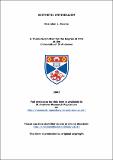Files in this item
Aesthetic antirealism
Item metadata
| dc.contributor.advisor | Gaut, Berys Nigel | |
| dc.contributor.advisor | Broadie, Sarah | |
| dc.contributor.author | Cooke, Brandon L. | |
| dc.coverage.spatial | viii, 194 p. | en_US |
| dc.date.accessioned | 2018-04-25T13:26:53Z | |
| dc.date.available | 2018-04-25T13:26:53Z | |
| dc.date.issued | 2003-06 | |
| dc.identifier.uri | https://hdl.handle.net/10023/13217 | |
| dc.description.abstract | A puzzle is generated by two intuitions about artworks: 1. There is no prima facie reason to take artworks to be mind-independent objects; 2. Aesthetic judgments are objective. These intuitions seem to be in tension, for if artworks or their aesthetic properties are mind-dependent, how can aesthetic judgments be objective? The common solution to the puzzle lies in rejecting or revising one of the two intuitions. Typically, realists reject 1, and many antirealists reject 2. I develop an antirealist aesthetic theory that accommodates both intuitions, focusing on critical disagreement between epistemically optimal judges, realist difficulties with supervenience and response-dependence, the role of imagination in the experience of artworks, and the metaphorical quality of aesthetic discourse. The hallmark of realism, namely the mind-independence of aesthetic qualities, is an untenable commitment that yields an impoverished view of artworks. A cognitivist anti-realism is available which preserves the objectivity of aesthetic discourse and yields a richer conception of artworks and our interaction with them. | en_US |
| dc.language.iso | en | en_US |
| dc.publisher | University of St Andrews | |
| dc.subject.lcc | BH39.C7 | |
| dc.subject.lcsh | Aesthetics. | en |
| dc.subject.lcsh | Realism. | en |
| dc.title | Aesthetic antirealism | en_US |
| dc.type | Thesis | en_US |
| dc.type.qualificationlevel | Doctoral | en_US |
| dc.type.qualificationname | PhD Doctor of Philosophy | en_US |
| dc.publisher.institution | The University of St Andrews | en_US |
This item appears in the following Collection(s)
Items in the St Andrews Research Repository are protected by copyright, with all rights reserved, unless otherwise indicated.

